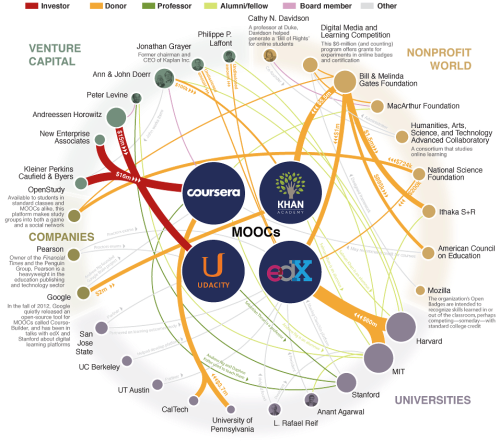Universal access to high-quality college courses at low cost for students anywhere with an Internet connection continues to make Massive Online Open Courses (MOOCs) the innovation that will, in the minds of its advocates, “revolutionize” or to use the favorite word of entrepreneurs, “disrupt” higher education.
Deep and abiding issues, however, prevent MOOCs from revolutionizing higher education. One issue is money. States have reduced funding for public higher education institutions. Universities have lowered labor costs by increasing adjunct and part-time faculty yet have raised tuition so that students face prices for going to college that far outstrip increases in wages and the cost of living. So how can MOOCs be converted into a revenue stream for money-strapped institutions? The other issue is the pattern of universities taming innovations to keep things as they are, a pattern that entrepreneurial reformers scorn and wish to overturn.
In the search for more students and more money, there have been a flock of start-ups in the emerging industry of MOOCs just as there have been among automobiles companies in early 20th century and telecommunications in late-20th century.
Of course, mortality rates run high in new industries as consolidation and new technologies come and go. Few remember car companies such as Packard or Hudson or, more recently the Hummer. In computers, what about Atari, Napster, Palm Computing, or Sun Microsystems? Or recall that Columbia University launched Fathom in the 1990s to promote online courses taught by its stellar faculty. Within a few years, Fathom sunk and was flushed, along with millions of dollars, down the toilet. As universities figure out how to make money from MOOCs–see efforts to have students pay for certificates, badges, and deals with universities where start-ups provide credit-bearing courses to students–the online industry will also shake out (as of last month, there are 28 providers of MOOCs internationally) with some of the current key players gone by 2020.
Why will some of these MOOC start-ups die? It is hard to make sufficient money year-after-year from delivering instruction because teaching and learning, unlike automobiles and washing machines, are not subject to productivity and efficiency gains.
Economists call this the “cost disease.” It applies to higher education and K-12. That is, in some kinds of labor-intensive work–nursing, social work, teaching, the performing arts–wages rise but productivity remains largely the same. Or as one economist put it: “While productivity gains have made it possible to assemble cars with only a tiny fraction of the labor that was once required, it still takes four musicians nine minutes to perform Beethoven’s String Quartet in C minor, just as it did in the 19th century.” Salaries for orchestra members increases over time but the quartet still plays Beethoven’s C minor piece in nine minutes. In a fit of humor, another economist made the same point about the “cost disease” phenomenon: With the possible exception of prostitution, teaching is the only profession that has had no productivity advance in the 2,400 years since Socrates taught the youth of Athens.
And so it is for K-12 teachers, professors, nurses, and other professionals in labor-intensive work. Efforts to stem the “cost disease” by measuring teachers’ performance based on test scores and linking results to salaries or tenure decisions on the basis of student evaluations of their professors’ instruction try to outflank the productivity issue but have failed to do so thus far.
Another reason MOOC start-ups will die is that colleges and universities tame innovations by incorporating aspects of the “newest thing” into existing structures and programs. Although critics would avoid the word “tame” in exchange for the word “co-opt,” the result is the same: institutions adopt changes to maintain continuity or what some academics call “dynamic conservatism” (see 1970_reith2-1). For MOOC entrepreneurs and those who seek to overhaul higher education, this strategy of maintaining institutional stability is both frustrating and wrong.
Consider the market-driven solution that Andrew Kelly and Frederick Hess propose (see Beyond Retrofitting-Innovation in Higher Ed).
…cheerful claims that American higher education is undergoing an irresistible
change driven by digital technology are unduly optimistic. Technology has the potential to transform higher education as it has other knowledge-based sectors like music, journalism, and financial services, where new providers have unbundled goods and services and improved access and convenience while reducing costs. But technology does not guarantee innovation. Innovation demands that entrepreneurs use technology to re-engineer higher education.
The re-engineering that Kelly and Hess propose is to deregulate higher education (e.g., federal and state rules about accreditation of institutions, breaking up a college degree into pieces–“unbundling” as they put it–that students can re-assemble from different providers), focus on outcomes (e.g., what students learn, completion rates, success in job market) rather than spending time in classes for four years, and create a market where suppliers (e.g., for-profit and non-profit companies) compete for students who can assemble different pieces of learning from various companies. In short, Kelly and Hess want to deregulate higher education and create a competitive market where innovation will become omnipresent. And that is where MOOCs fit in, according to Kelly and Hess (June 24, 2013).
Advances in technology have made it possible to unpack a bundle of goods and services into their component parts and sell them separately, enabling customization and lowering of prices.
To transform higher education, issues of funding and universities taming innovation can be avoided if suppliers and consumers would operate within a market model. Retrofitting would be passe. Both the nation and students would benefit.
Which direction, then, for MOOCs?
Given the history of universities and colleges in the U.S., chances are that many higher education institutions (non-elite and community colleges) will continue to retrofit and transform MOOCs into credit-bearing courses that will yield revenue. MOOCs will not revolutionize higher education.
But higher education, already a collection of different markets serving different consumers, becoming deregulated and unbundled as Kelly and Hess propose is highly unlikely now and in the immediate future.




Pingback: Whither MOOCs? | Educacion, ecologia y TIC | Sc...
Pingback: Whither MOOCs? | E-Learning-Inclusivo (Mashup) ...
Pingback: Whither MOOCs? | All about (M)OOC & OER | S...
Pingback: Whither MOOCs? | MOOCs_nro | Scoop.it
Pingback: Whither MOOCs? | digital divide information | S...
In 2004, the previous UK administration wound up their proposed E-University at a loss of £50million. The reasons for the failure of this grand project are well worth reflecting on for anyone involved in MOOCS. They can be studied in detail in the UK government report below. But in essence, this is what the committee decided.
It failed largely because it took a supply-driven, rather than demand-led approach…it pursued a narrow concept of e-learning (wholly internet based e-learning) and did not adapt this initial concept in light of existing research evidence that found that a more blended learning approach was needed (where internet based e-learning is undertaken alongside other, more traditional, learning methods). There was a distinct lack of marketing and use of market research—in such new and emerging markets this was a key failure… and the project was technology-driven…with too much emphasis being put on the development of the technological platform.
Click to access 205.pdf
Again, Joe, thanks for sending along the report on e-learning venture sponsored by the Labor government a decade ago.Sounded like Columbia University’s Fathom effort except in UK it was taxpayer funded.
Pingback: Whither MOOCs? | Larry Cuban Blog | Digital Med...
Hi Larry. The examples of cost disease don’t seem accurate. Musician productivity has soared. Four musicians playing a Beethoven quartet can now be listened to by millions of people. The same input (four musicians for nine minutes) has a vastly larger output (listens). In movie soundtracks, most strings are computer synthesized; no musicians are involved. Even in live performances, amplification means audiences can be 10 or 100 times larger.
Nursing is also being automated. They are building senior-care robots in Japan. There are now dialysis machines that can be self-administered at home for some types of kidney disease. And in New Zealand: “Nursing productivity rose significantly with the health reforms of the 1990s that reduced nursing input costs but impacts on patient safety and nurses were negative. Current approaches to increasing nursing productivity, including the “productive ward” and reconfiguration of nursing teams, also draw on manufacturing innovations” (http://www.emeraldinsight.com/journals.htm?articleid=17032052&show=pdf)
Will MOOCs succeed? Who knows, because they are mostly “automating the cow path”. The whole idea of a “course” being something that runs for 13 weeks may be as anachronistic as TV shows only being available once a week. With teaching it’s not going to be the technology, but what it enables that changes things. Peer grading, which a Toronto MOOC is using, is not a technology, but relies on web technologies.
Ursula Franklin said “the tool defines the task”. A technology cannot help but change the society using it. But no worries; we’re in a MOOC hype phase; it could be twenty years for higher education to change.
Ian, thanks for the comment. I believe that we are using different definitions of productivity. Sure, more people listen to those four musicians playing for nine minutes the Beethoven piece. That is an increase in productivity when inputs in relation to outputs (more listeners) are considered as the definition. Were those four musicians to play the piece in four minutes, they would be productive in speeding up the process of playing the music but what would be produced would be unrecognizable. Ten year-old students learning the concept of evolution from their teacher takes a certain amount of time (depending on the expertise of the teacher or software program students use). The labor-intensive nature of teaching and learning means that certain amounts of time must be spent in both activities. Surely, the teaching task can be telescoped, i.e., sped up, but whether the student learns it speedily is another matter. So I use a different definition of productivity.
Pingback: Whither MOOCs? | ilene_scoops | Scoop.it
Hi Larry,
I am currently building an idea that takes a different approach to disrupting higher education by utilizing the popup model to create short innovative learning experiences. The focus would be more on quality than quantity. It won’t reach as many people as a MOOC would but I think it could be used in combination with MOOCs for self-directed learners. I am also advocating for the use of project based and just-in-time learning over pursuing majors and field of studies. Would love to hear your thoughts on this format:
http://crowdhitch.millennialtrain.co/campaign/detail/1524
Good luck on your Kickstarter campaign, Gregory. What you propose looks promising and I wish you well.
Pingback: Whither MOOCs? | e-learning-ukr | Scoop.it
Pingback: Whither MOOCs? | ADP Center for Teacher Prepara...
Pingback: Whither MOOCs? | Information and digital litera...
Pingback: This Week’s “Round-Up” Of Good Posts & Articles On Education Policy | Larry Ferlazzo’s Websites of the Day…
Pingback: Whither MOOCs? | cMOOC xMOOC review | Scoop.it
Pingback: Whither MOOCs? | Web2.0 Education | Scoop.it
Pingback: Whither MOOCs? | Online and or Blended Learning...
Pingback: The Best Posts & Articles On MOOC’s — Help Me Find More | Larry Ferlazzo’s Websites of the Day…
Pingback: Whither MOOCs? . . .highly unlikely now and in ...
Pingback: Whither MOOCs? | knowledge | Scoop.it